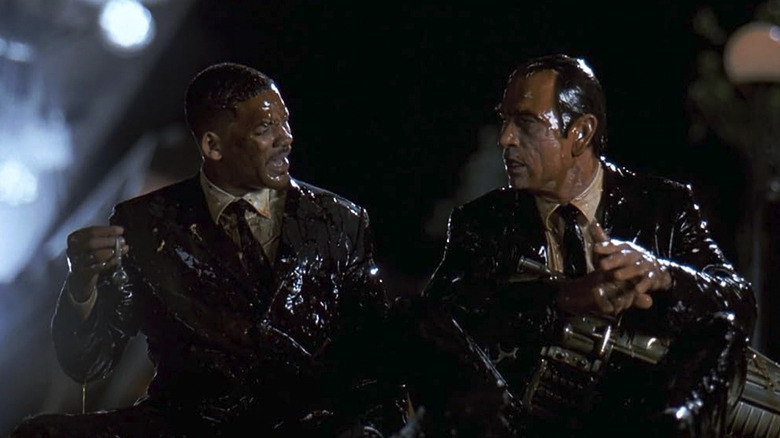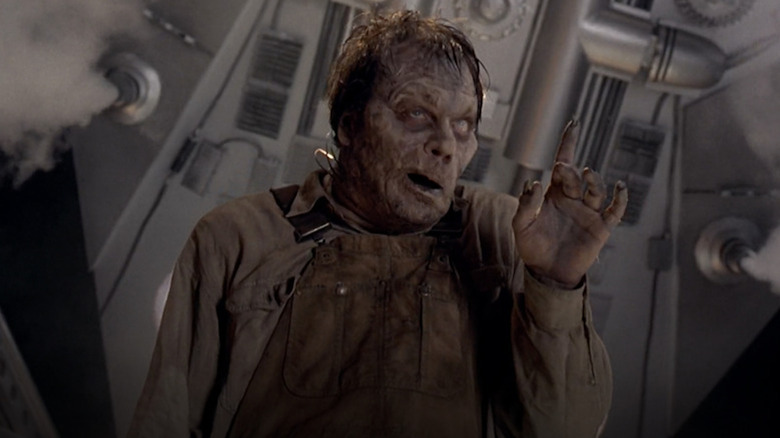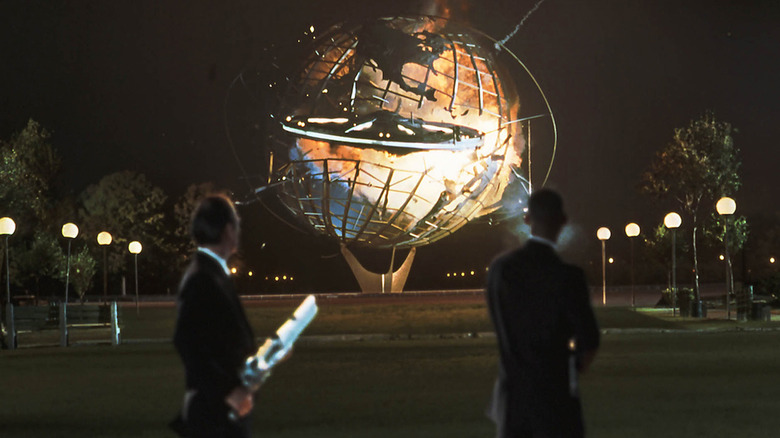Men In Black's Classic Ending Was A Frenzied, Last-Minute Addition
We may receive a commission on purchases made from links.
"Men in Black" is the best kind of blockbuster. It's uncommonly smart, riotously funny, exciting, heartwarming in spots, mean-spirited in others and, best of all, short. Yes, Roger Ebert was right when he said that no good movie is too long and no bad movie is short enough, but big summer movies have a tendency to give 'em too much of what they want. Sometimes, it's okay to leave the audience wanting more — and by this I do not mean a post-credits stinger hyping the next movie in the franchise (although I am old enough to remember the thrill of waiting through the credits of a new 007 movie so I could see the "James Bond will return in..." title that typically gave viewers the title of the MI6 agent's next adventure).
At 98 minutes, "Men in Black" zips by. It's one of those films that's so meticulously structured, so savvy in its setup/payoff game that you figure it must've all been on the page by the time they started shooting the movie. For a long time, I figured this. Turns out I was figuring wrong.
According to Barry Sonnenfeld's new memoir "Best Possible Place, Worst Possible Time: True Stories from a Career in Hollywood," the final set piece at the twin observation towers left over from the 1964 New York World's Fair in Queens was nearly a clunky, action-free conclusion. Sonnenfeld hated this, and demanded a rewrite. In doing so, he probably saved the movie. If nothing else, he absolutely wound up spending a good chunk more of Sony's money.
Thank god for cockroaches
Once a week while in the midst of principal photography on "Men in Black," Sonnenfeld had a Sunday routine, which he began on the "Addams Family" movies, where he would re-read the script and watch his assemblage. Every week, he learned something new about his movie, while being constantly reminded that, as he wrote in his memoir, "WE HAD NO ENDING."
What did they have? Per Sonnenfeld, "Our film's climax consisted of Will Smith debating the nature of the universe with a million dollar, 15-foot-tall animatronic Rick Baker-designed Edgar Bug." He would hop on a call with Walter F. Parkes and Laurie MacDonald (who'd just teamed with Steven Spielberg to launch DreamWorks SKG's film division) and Sony's vice-chair Lucy Fisher, and remind them that their ending, in his words, "sucked."
The screenplay is credited to Ed Solomon, who is a brilliant writer and who, to the best of my knowledge, richly deserves that solo credit. Evidently, he wasn't available to fix the ending, which I'm guessing is why they brought in a "Friends" writer to figure it out. According to Sonnenfeld, aside from contributing a few gags, that person didn't get the job done.
Sonnenfeld had a vague idea of what they needed to do:
"'We need to lose the debate,' I kept whining. 'We need Edgar in motion, climbing up the tower to his flying saucer and we need Will fighting Edgar, trying to keep him on the planet. When that fails, we need Will to do something that makes Edgar turn around and climb back down from the tower.'"
Edgar (played to oddball perfection by Vincent D'Onofrio) had a couple of weaknesses. One was his love for "sugar water." Perhaps he flings Will from the tower into a Coke machine, which starts spraying sugary soda all over the ground. The other option was to have Will start squashing Edgar's Earth-bug relatives, cockroaches, as they scurried across the pavement.
Spielberg liked the cockroaches, so, buoyed by some inspired Will Smith improv, they went with the finale you see in the movie now.
Aside from some awkwardness with the cockroach wrangler (Sonnenfeld was perplexed by the need to treat each roach life as sacred), they got what they needed on set. Alas, the director had a new problem — two new problems, actually. He had to ask for extra money to shoot the CGI-heavy opening and closing credits sequence, and he needed more cash to complete the also-CGI-laden World's Fair set piece. The price tag: $4.5 million.
How did he pull it off?
Here's how Barry Sonnenfeld saved Men in Black's ending
First, Sonnenfeld had a horrifically unproductive conversation that went a little something like this:
"'I'm not going to ask Steven,' Walter bravely stated.
'Don't you want to make the movie better?'
'I'm not asking Steven.'
'OK, Walter, You ask SONY.'
'Not my job.'
'Not your job?!'
'Steven will feel asking the studio for that kind of money is irresponsible and I'm his partner, so I won't ask the studio either.'
'You're also my partner, Walter. In fact, your main job as producer is to hire the right director, which you've done, and then do whatever you can to help that director make the best movie possible. The worst that happens is you ask for the money and the studio says no. I mean, it's not like it's your money.'
'Ask if you want, Barry, but neither Steven nor I will go to the studio for that kind of money.'"
Sonnefeld sucked it up and asked Lucy Fisher for $4 million in the least dignified manner he could muster: He put his head in her lap and cried like a helpless child. "I need four and a half million dollars to finish the film in a good way," he told her. "Wow. That's a lot," she gulped.
Sonnenfeld felt he'd creeped Fisher out to the point where she had to at least let him make the case. After explaining the scenes in detail, Fisher signed off on the budget uptick "on the spot." "Lucy really wanted out of there," wrote Sonnenfeld, "Even if it cost her studio millions."
Thank god Sonnenfeld is devoid of pride, because I can't imagine "Men in Black" working without these scenes. But now I have to wonder how much crying Sonnenfeld did during the shoot of "Men in Black II," and how much more he would have had to sob to make it semi-watchable.


